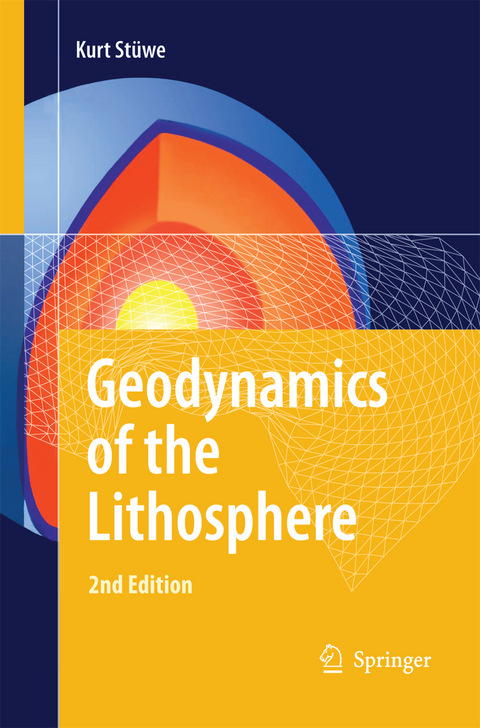
Geodynamics of the Lithosphere
Springer Berlin (Verlag)
978-3-642-44814-0 (ISBN)
The large scale structure of the earth is caused by geodynamic processes which are explained using energetic, kinematic and dynamic descriptions. While "geodynamic processes" are understood to include a large variety of processes and the term is used quite loosely, the methods of their description involve well defined fields. Energetic descriptions are involved with distribu tion of energy in our planet, typically expressed in terms of heat and tempera ture. Kinematic descriptions describe movements using velocities, strains and strain rates. Dynamic descriptions indicate how stresses and forces behave. In the field, we document only the consequences of geological processes. The underlying causes are much harder to constrain directly. Nevertheless, if we want to explain the tectonic evolution of our planet, we need to interpret these causes or: "driving forces" . For this, we need to find a dynamic description of geological processes that is consistent with our observations. Our descriptions relate causes and consequences - tectonic processes with field observations. In many cases, we will use equations as a concise form to describe processes and observations in nature. As we will be dealing mostly with large scale tectonic questions, the observations that we shall use are also on a large scale. For example, we shall use observations on the elevation (Fig. 1. 1) and heat flow of mountain ranges, the thickness of continents and the water depth of the oceans.
Plate Tectonics.- Energetics: Heat and Temperature.- Kinematics: Morphology and Deformation.- Mechanics: Force and Rheology.- Dynamic Processes.- Metamorphic Processes.
From the reviews:
"The book is a reflection of the author's amazing grasp of various facets of geodynamic processes, technically a difficult subject to communicate - discussed in most lucid terms. This book differs from its predecessor Geodynamics by Turcotte and Schubert, a classic textbook in its own right, in that the target audience purportedly is the field geologists. The new book also differs in its emphasis on orogenesis, metamorphism, heat transport, crustal thickening and geomorphology, probably an indication of the author's own predilections as a geologist. The high point of the book is its treatment of mathematics and the way in which it is made accessible to field-oriented geologists. .. Here is a book that is highly eligible to be included in the geology graduate studies under our universities. I also encourage our geologists to read this educative book, indeed a valuable addition to the expanding information base on quantitative geodynamics."
C. P. RAJENDRAN, Current Science Dec. 2003
"This book by Kurt Stüwe is a great and interesting introduction to quantitative physical geology ... . I liked the problems at the end of each chapter. ... The author does a great job of cross-referencing chapters and sections of the book. ... this book would be a great place to start learning. I believe that anyone with a solid math and physical science background and an interest in quantitative geology would enjoy this book ... ." (Joe Ho, SIAM Review, Vol. 47 (4), 2005)
"The numerous black and white figures ... are clearly drafted and on the whole succeed in conveying often quite complex concepts and relationships within a well structured text with carefully set out equations. ... the reader is rewarded with a deeper understanding of the matters in hand and an introduction to the literature ... . Each chapter ends with a series of concise problems with elegant solutions ... . provides important data, an excellent conversiontable and a comprehensive list of relevant web sites." (David Nowell, Geoscientist, Vol. 14 (1), 2004)
"This is a rather admirable book. ... It is all done very well ... . The author is good at explaining why equations have the form they do, and what the different terms within them mean. Anyone who can really follow and master this book in detail will be a very good all-round quantitative geologist indeed. ... This book will be an excellent starting point and introduction to many topics in geodynamics. ... The book is short, concisely explained, and well-produced." (James Jackson, Geological Magazine, Vol. 140 (2), 2003)
"This monograph ... deals in a pretty comprehensive way with the physical and mathematical modeling of the lithosphere of the earth, thus representing a textbook and reference at the same time. ... Altogether the author succeeded in writing an excellent book ... . warmly recommended to geologists or geophysicists ... . Moreover, it can be of immediate use to engineers involved in the construction of streets, bridges, buildings, tunnels, or mining facilities closely related to the properties of the earth's mantle ... ." (H Lippmann, Applied Mechanics Reviews, Vol. 56 (3), 2003)
"This is a very different book ... . Stüwe approaches the subject from a more geological direction ... . In my opinion, his efforts are rewarded with a text that I think will stand the test of time ... . Stüwe's book offers an alternative route into topics that can seem daunting because of the attached mathematics. ... It certainly is a book that I will keep to hand as a useful reference ... ." (G. A. Houseman, The Australian Geologist, Issue 126, 2003)
"The book intents to bridge the gap between mathematics and the modelling of geodynamic processes. Its purpose is to introduce the field geologists, be it a structural geologist or petrologist, with 'the beauty and simplicity of descriptions with equations'. ... The book is very wellwritten and clearly illustrated. The author assures that little mathematical knowledge is required." (Prof. Dr. Manuel Sintubin, Geologica Belgica, Vol. 5 (1-2), 2002)
| Erscheint lt. Verlag | 6.12.2014 |
|---|---|
| Zusatzinfo | XIV, 493 p. |
| Verlagsort | Berlin |
| Sprache | englisch |
| Maße | 155 x 235 mm |
| Gewicht | 771 g |
| Themenwelt | Mathematik / Informatik ► Mathematik ► Arithmetik / Zahlentheorie |
| Naturwissenschaften ► Geowissenschaften ► Geologie | |
| Naturwissenschaften ► Geowissenschaften ► Geophysik | |
| Naturwissenschaften ► Physik / Astronomie ► Thermodynamik | |
| Schlagworte | Deformation • Geoinformationssysteme • geomorphology • Lithosphäre • Lithosphere • Mechanical Modelling • Mechanische Modellierung • Plate Tectonics • Rheologie • rheology • Thermal Modelling • thermische Modellierung |
| ISBN-10 | 3-642-44814-3 / 3642448143 |
| ISBN-13 | 978-3-642-44814-0 / 9783642448140 |
| Zustand | Neuware |
| Informationen gemäß Produktsicherheitsverordnung (GPSR) | |
| Haben Sie eine Frage zum Produkt? |
aus dem Bereich


